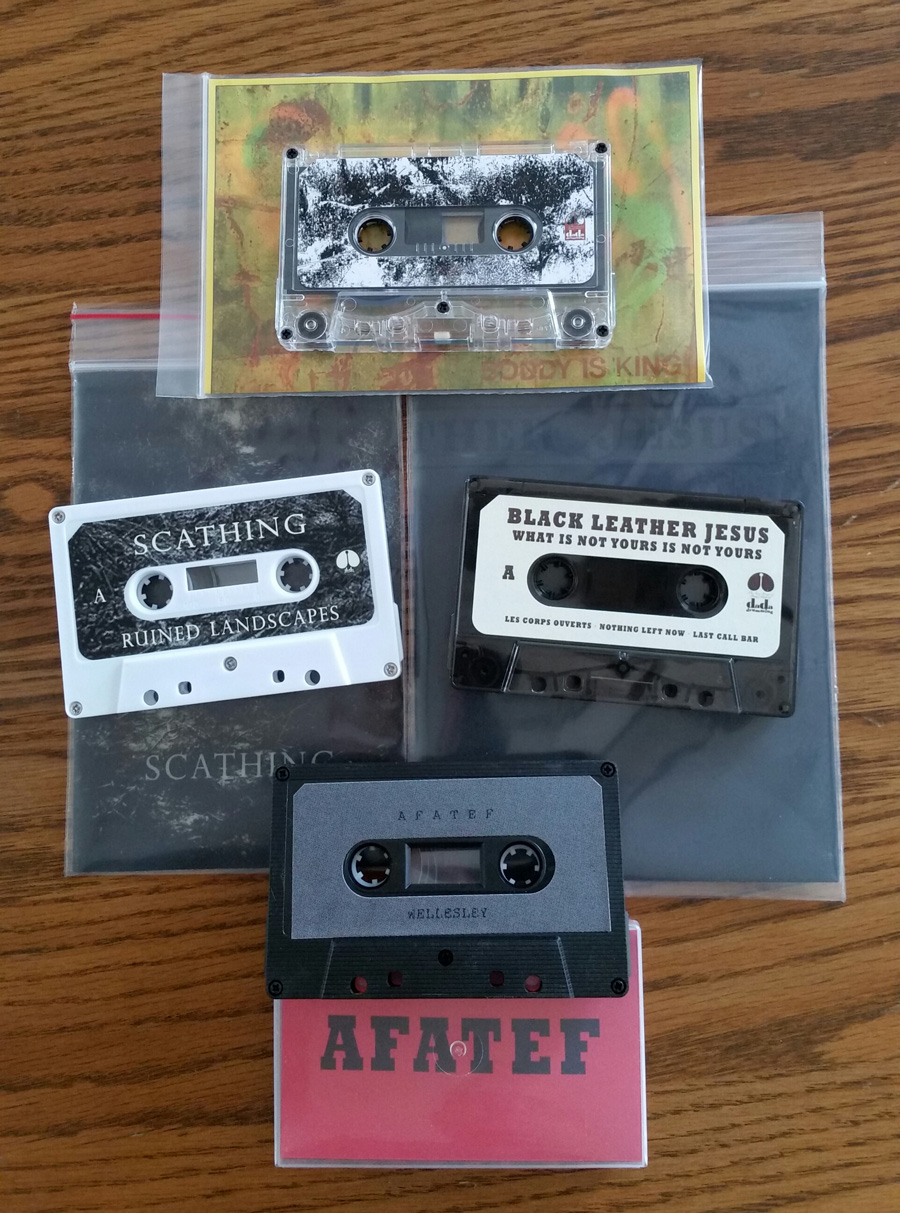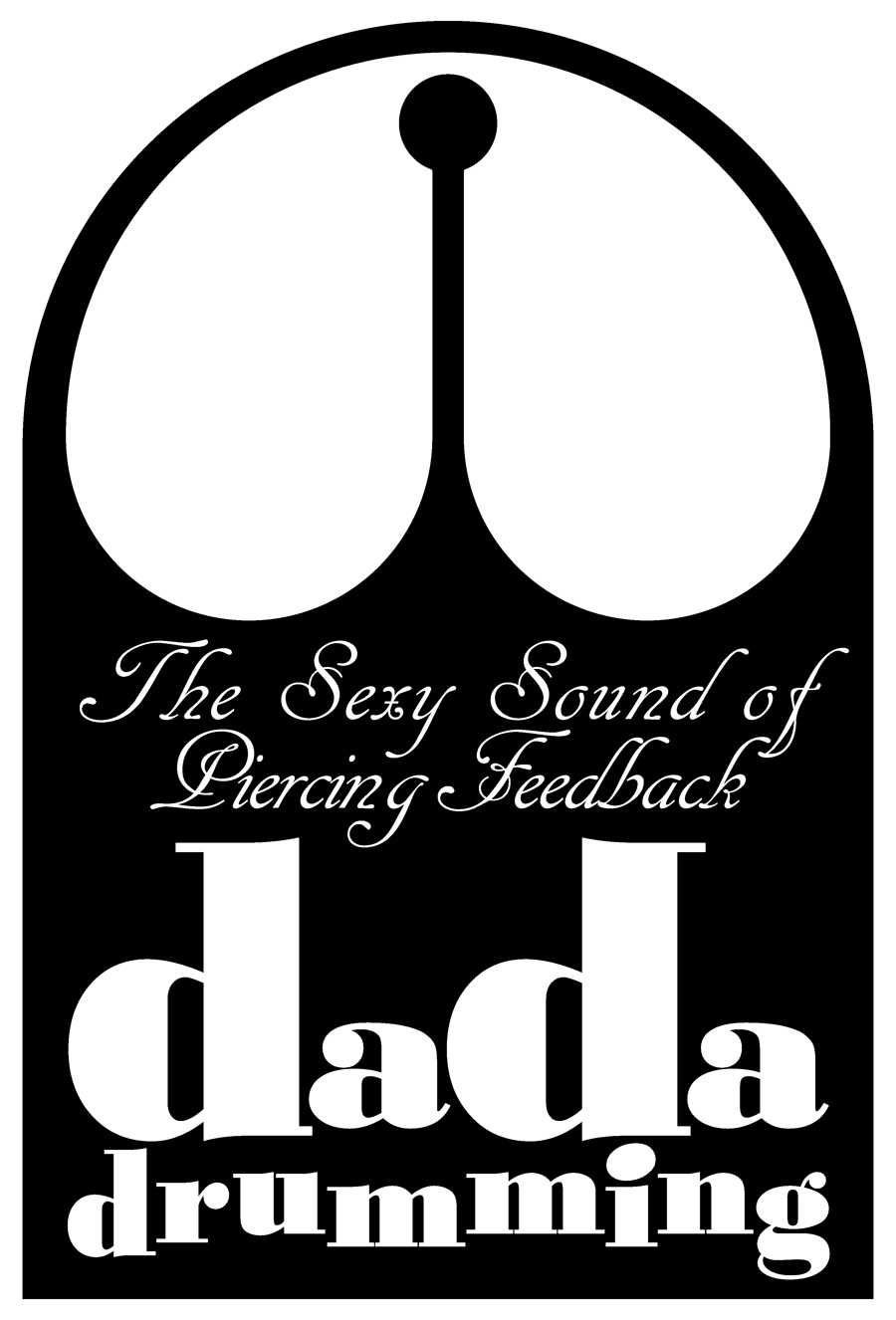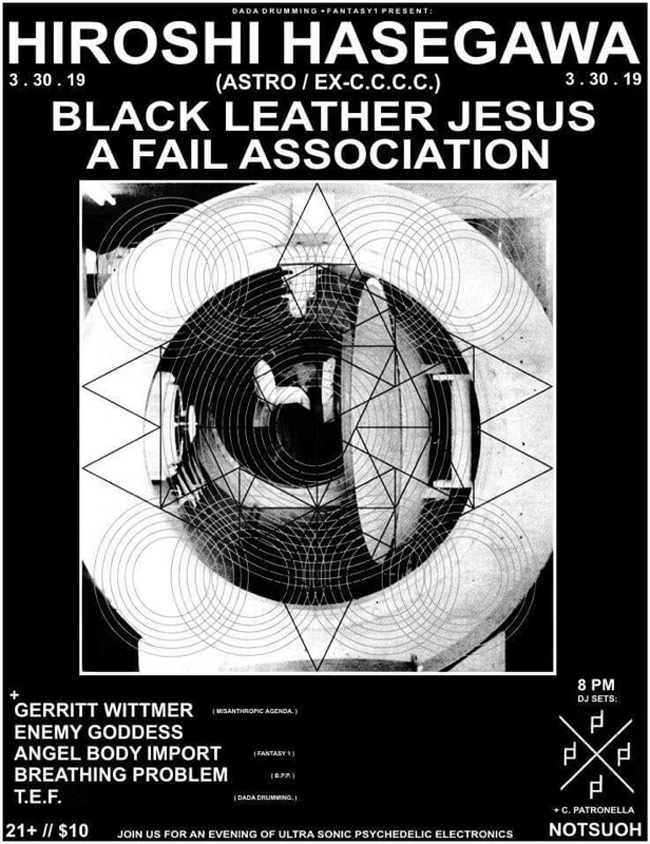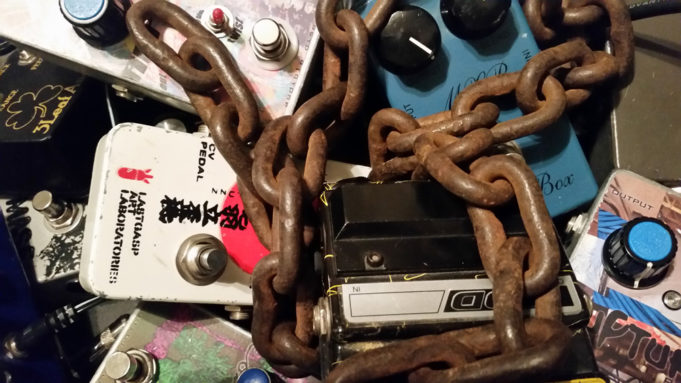When thinking of towns with reputations as epicenters for wild, experimental, and fiercely underground artistic movements, it’s likely the usual suspects cross your mind. New York, London, Paris, L.A., or Berlin, perhaps. Yet, unlikely as it may seem, nestled within the dusty, decidedly un-dernier cri flatness of our own Texas backyard, resides a small independent record label that functions as one of the better appreciated sources for one of the more stridently boundary-pushing artforms: the niche, subterrestrial music genre known simply as “noise.”
Characterized by unconventional instruments, found sounds, and heavily manipulated effects and electronics, noise music is as “out there” as music can be. Brittle, dirging, often abrasive, it can be a challenge for many to absorb. Imagine the exact sonic opposite of an intricate baroque symphony but lovingly crafted with the same care and attention to detail that any master composer would employ. Compositions can appear random, directionless, and inadvertent — and no doubt random chance and serendipity certainly play a role in the music’s creation — yet just as Jackson Pollack’s indiscriminate splattered works are now appreciated, a noise artist is no less focused and intentional. There is purpose, craft, and a concrete objective. As far as any music genre can exist purely as art for art’s sake, noise practically deserves its own wing in the Met.

Courtesy Greg Babbitt
Shockingly, a Fort Worth-based musician and label-runner named Greg Babbitt is one of the most reputable purveyors of noise material that can be found. His small self-funded Dada Drumming stands as tall as any other bulwark in the noise scene — staples such as France’s Atypeek Music or Home Normal in the U.K.
“I do mostly noise, of course, but that’s not all,” Babbitt said of Dada Drumming’s focus. “I don’t really stick to one format, and I never have. I try to focus on stuff you can’t hear on the radio or even find in record stores, for that matter. I do metal. I like ambient music, experimental music. I’ve done hardcore records. If I like something, I’ll put it out.”
Dada Drumming markets the works of a far-ranging international cadre of artists. He sells vinyl, CDs, and cassette tapes that he still dubs by hand. His catalogue has earned a highly regarded reputation and is ravenously devoured by the close-knit, obsessive noise music circle.
As hinted at by Dada Drumming’s motto (“The Sexy Sound of Piercing Feedback”), noise is perhaps the most appropriately named musical subgenre ever conceived. Shrill electronic buzzing, monotone TV static, metallic bashes and clangs created with guitar effects pedals, modular synthesizers, sheet metal and lengths of chain — these are the tools of the noise artist. Not necessarily the pleasing warm honey-tone of a Stradivarius. As a result, few are lukewarm about it upon hearing it. For the many who simply don’t get it, at best, it might “just not sit well.” For others, it can be actively repulsive, but there are a few who do find the thread. These types then typically dive into the genre with the full collector-type enthusiasm of comic book traders, always searching for more — the rarest, the most sought after, the strangest, the most extreme.
“People never stop chasing new music,” Babbitt said, “always wanting to be the first to have heard something.”
Dada Drumming has been a steady resource for those forever hunting their next aural fix for nearly two decades.
“I became involved in noise 15 years ago,” said Luke Tandy of Heat Signature, a Dada Drumming artist. “Dada Drumming was one of the first labels I discovered that I felt a connection with. It’s one of those labels that has such a consistent level of quality that you just trust in what they’re putting out and don’t feel afraid to take a chance on buying something you’re not familiar with.”
After a brief period of dormancy over the past few years, Babbitt has Dada Drumming back and fully operational again and is dropping the harshest, most intense, and most imaginative material available, returning to his former steady clip of releases. Most recently, the moniker has commissioned albums from a trio of revered Japanese avant garde and noise composers. Hiroshi Hasegawa (Astro, C.C.C.C.) presented a new double LP of live performances captured while on tour throughout Texas, Kazuya Ishigami (Daruin) offered a mesmerizing new work of moody drone titled Mind Liberation, and an artist named Kimihide Kusafuka, better known as K2, dropped the third and proposed final volume of his Rainy Tritium series of albums.

Courtesy Greg Babbitt
Any one of these artists would be an impressive get for any noise-centric label, but together they represent an enviable top-tier collection that’s indicative of Dada Drumming’s earned reputation among the tightly knotted noise community. Though they could choose from many other outlets with which to release their projects, these artists continue to trust their work to a small, unassuming imprint from Fort Worth, Texas.
“He is as true as it gets,” said DOMOKOS, another Dada Drumming artist, about how the label has earned the means to work with such regarded artists. “To be associated in any capacity with Dada Drumming is nothing to be taken lightly. It is as serious, true, and quality-driven as a label can get. There is no bullshit involved whatsoever.”
Taylor Geddes, who heads his own noise label called Absurd Exposition, which has released material from Babbitt’s own noise project, A Fail Association, agrees.
“Dada Drumming has always been consistent with the types of noise and [other] music that appear on the label,” he said. “Looking through the catalogue — with Texas harsh noise projects like Black Leather Jesus and T.E.F. and a strong line to some of the essential Japanese noise artists like Incapacitants, K2, and Mo*Te — it’s all these varying points of grit, piercing feedback, and raw aggression coming to a head under one banner.”
Babbitt, charmingly humble, shies away from any accolades directed at him for his efforts.
“This isn’t about me,” he made a point of saying. “I’m not looking to be patted on the back. I do this because I’m a fan. I am a fan of this music first. I don’t like to be front and center. I’m a drummer [as a musician]. I’d just rather be in the background doing my thing.”
*****
The 53-year-old Babbitt started Dada Drumming in 2003, mostly as a way to be able to listen to friends’ music that he was a fan of. He was discussing with a buddy he met on an internet noise forum (a popular meeting space for tech-centric fans of intense music) about finding a way to put out the material for his band Deadly Orifice. After exploring options, one day, Babbitt simply decided to take the task on himself.
“I used to collect this music,” he explained, “trading tapes and ordering records out of the backs of zines. I figured it wasn’t too difficult. A friend of mine needed a way to release his stuff, so I said, ‘Hell, I’ll do it.’ ”

That initial release, a split between Deadly Orifice and another group, Praying Gods, became release DD01. Interestingly, the pressings have been removed from Dada Drumming’s catalogue. Deadly Orifice is a Canadian band. When delivery was made, the discs were confiscated by the Canadian customs officials at the border.
“They opened them up, and there was some artwork inside that we’ll just say they found ‘questionable,’ ” Babbitt recalled. “It made me think, ‘Crap! Are they going to look inside everything I send?’ I decided it would just be better to remove it from my catalogue to avoid any problems.”
That initial release, naturally, has become a highly sought-after cult-favorite collector’s item.
Since that first split, Dada Drumming has totaled more than 80 releases. Though noise does account for the bulk of the catalogue, it’s not all Babbitt champions. He has released music from Israeli power violence outfit Rabies Caste, as well as local hardcore bands Four Days to Burn and Resigned to Fate, and, perhaps most notably, Dada Drumming put out the lone album from Fort Worth’s own Great Tyrant, the project that sits in the middle of the slow transition from local experimental band Yeti to their present-day form known as Pinkish Black.
“I had a kid email me one day about how he found the Great Tyrant record, not knowing what the hell it was,” Babbitt recalled. “He was freaking blown away. If I could sell records to just that one kid, I would. That’s what it’s about. Music can change you.”
*****
If you’re unfamiliar with noise music, you may count yourself among the majority. The genre is so niche it makes Norwegian Viking metal look as big as Beyoncé as far as popularity goes. Though its modern form splinters from an inconspicuous node on the tree of musical history located near the fork formed by the divergent branches of experimental electronica and goth-themed industrial, noise can actually trace its lineage all the way back to the early 20th century. A style employing some of the same philosophies valued by modern artists was born out of the Dadaist art movement that arose out of Switzerland in 1916.
Dadaism began as a reaction to the horrors of World War I that had been ravaging most of Europe over the previous two years. Initially a loose, small community, eventually artists, poets, and performers from all across Europe and eventually the United States were associated with the movement. These artists created satirical and often nonsensical works as a means to ridicule, and as an attempt to destroy, traditionally accepted Western artistic values. The rationale was that any society that could allow and perpetuate such a grievous tragedy like multinational war needed every aspect of its culture evaluated, and subsequently realigned, including its art.
To call into question the very concept of what qualifies as art, French-American artist Marcel Duchamp exhibited “Fountain.” A porcelain urinal turned on its back and signed “R. Mutt 1917,” it was submitted to New York’s Society of Independent Artists and quickly became the movement’s most famous, and perhaps its most definitive, piece.

Courtesy Greg Babbitt
The Dadaist philosophy eventually made its way into music composition. A pioneer in the style was Italian futurist artist Luigi Russolo. A participant in so-called “anti-symphony,” he employed the sounds of everyday objects and experimental, anti-tonal instruments he called intonarumori to create bizarre compositions. In his manifesto “The Art of Noises,” Russolo explains his motives.
“At first, the art of music sought purity, limpidity, and sweetness of sound … care being taken … to caress the ear with gentle harmonies. Today music, as it becomes continually more complicated, strives to amalgamate the most dissonant, strange, and harsh sounds. In this way, we come ever closer to noise-sound.”
Though the material Babbitt releases through Dada Drumming essentially conforms to Russolo’s general philosophy, and the label’s moniker borrows the Dada name, he stops short of claiming some profound and culturally relevant artistic statement. He said the aim isn’t to challenge the motifs of popular music in some sort of grand provocation. His motives are much less complicated.
“My philosophy is: I release what I like,” he said simply.
If there’s one aspect of his musical worldview that does conform to the Dadaist tradition, however, it’s in his belief that in all art, including music, there should be no rules.
“No one should say, ‘You can’t do that,’ ” he said. “No one should say, ‘You can’t sing that song or play that note.’ People shouldn’t say you can’t enjoy nice poppy music. And they shouldn’t say you can’t bang a contact microphone on a staircase and call that music either.”
Babbitt acknowledges it’s likely the average music listener can struggle to make the required sharp turn from standard radio-formatted tuneage to embracing albums that consist of little more than an hour or so of harsh, screeching, manipulated feedback. It’s true, most people without a frame of reference would find Dada Drumming’s artists bizarre, and many would probably consider the material completely unrecognizable as “music.”
“That’s a valid opinion … for them,” he said. “And I don’t think that’s a bad thing. Not everybody has to like everything. The internet seems to make it seem like everybody has to like everything all the time. But they don’t. There’s things that they like that I probably don’t. And that’s OK, too.”
But to Babbitt and his label’s fans, the strange “unmusical” sounds hit at the same base emotional level that all music is capable of. It’s moving in a way that’s unexplainable yet commonly recognizable.
“Different music hits people in different ways,” he said. “You can’t explain it. It’s like meeting your wife for the first time and it hitting you like a wave. You just know. It’s definitely not for everybody. It’s like food. Some things are an acquired taste.”
Though the fanbase might be small and located in scattered areas, those areas extend around the world, a thing that’s demonstrated by the multiple countries represented on the label: Canada, Germany, Israel, and Japan, to name a few.
“There’s people doing this music everywhere,” Babbitt said. “You just might not know who they are. There may be one or two in Texas, maybe four or five in New York. The noise scene is massive in Japan. But the noise community is a big, incestuous circle. The internet has been revolutionary in bringing all these people together.”
Heat Signature’s Tandy also values the international quality of the noise scene and Dada Drumming’s place within it.
“Greg has a strong sense of curating a no-filler roster of artists delivering the best in intense and extreme sounds,” he said. “Although the label works with international artists, Greg is especially in-tune with the best harsh noise happening in the U.S., both more established and newer acts.
*****
Babbitt is certainly proud of his roster of artists from around the globe, but he said he wants to work with more local artists as well, something he’s done in bits in the past. He has plans to do just that with a band unlike any he’s released before.
“I’m actually gonna release an alternative rock band,” he said in a way that hinted that even he was surprised by the suggestion. That band, Love in Reverse, is set to join the likes of Rabies Caste, T.E.F., and Scream and Writhe, a sort of relationship that, although different, Babbitt doesn’t see as contradictory.
“I’ve had lots of artists,” he said. “None of them, when they find out I do noise, have ever gone, ‘What the hell is this?’ ”
Now that the label is ready to roll again, Babbitt has a ton of material in the pipe. Joining Love in Reverse in upcoming releases from Dada Drumming are Japanese sound composer MO*TE, Tandy’s Heat Signature, noise artist Sunk Cost, a death/grind 7-inch for Intestinal Fortitude, the side project of Devourment’s Chris Andrews, and a CD from Japanese grind outfit Napalm Death Is Dead. So, if noise isn’t necessarily your thing, there’s plenty of other options, and Babbitt hopes you give his label a chance.
“It would be foolish to open a store and say only certain people can come in to shop,” he said. “I’m not just one thing. Again, it’s like food. How are you gonna know if you like something unless you try it? This isn’t about money for me. It never has been. I mean, making money would be great — anybody who tells you different is lying — but I don’t make money on this. I lose money. But that’s fine. I have money that I’ve put toward this because I’m confident in it. I’m confident if people try it, some will like it. And those that don’t, that’s fine too.”













hopefully one day dada does a limited 1-copy edition chapeau box set – and sends it directly to interpol
*
Someone should ask Mr Noise to sing opera. It’s one of his hidden talents that I think would be a really interesting addition to his already amazing musical talents.